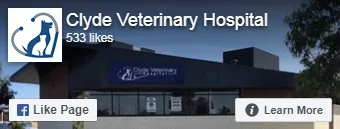DOG VACCINATIONS
Ensuring your dog or pup is regularly vaccinated from early on in life is essential to their long term well being.
Dr Irene Mitry places a tremendous weight on preventative veterinary care, and ensuring your dog is vaccinated against the most common contagious diseases is the basis of her approach.
At Clyde Veterinary Hospital, we use Adaptil anti-stress medication diffusers in our dedicated dog-only areas. So your dog will come away from their trip to Clyde Vet more stress-free and smiling than you will believe.
From a preventative medicine perspective, as well as annual vaccine booster shots, a regular annual check-up is crucial to making sure any developing conditions are nipped in the bud before they become a major problem. So we strongly recommend that your dog’s annual booster shot is the perfect opportunity for your pet to receive a regular health check-up.
Our purpose-built state of the art animal hospital, and Dr Miry’s strong preventative care focus make Clyde Veterinary Hospital the #1 choice for dog vaccinations in southeast Melbourne.
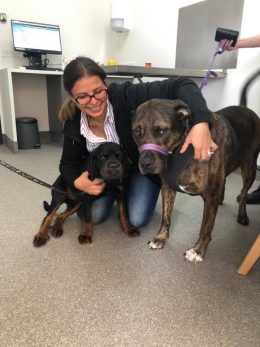
Preventative Care Focus
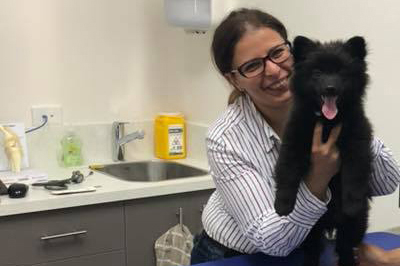
Easy Finance Available
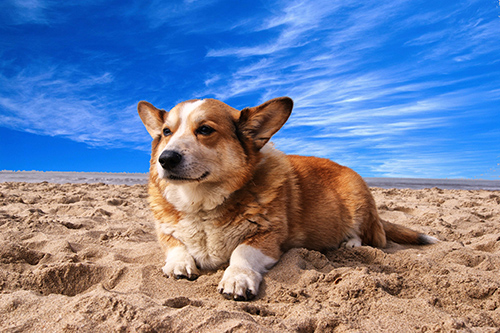
Book Securely Online
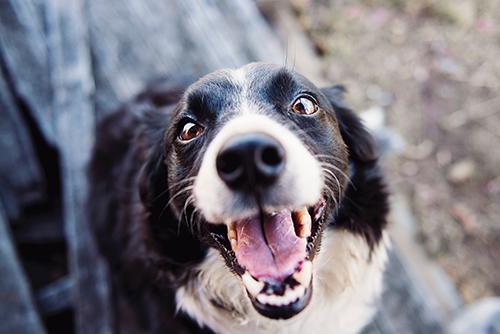
Dr Mitry’s “dog-side manner” is second to none, and she builds a strong preventative medicine focus into everything we do at Clyde Veterinary Hospital. Much more than just vaccinations, it’s also about your dog’s long term health and welfare.
And you can be certain in choosing Clyde Veterinary Hospital for your dog’s all-important vaccination regime that we taken all necessary steps to keep your dog or puppy’s stress to a minimum during their visit to Clyde Vet.
Clyde Veterinary Hospital offers flexible payment plans for vet bills, with multiple payment solutions to suit all of our customers.
This includes VetPay and GapOnly, with each choice offering different advantages and considerations.
Your fur pal will have access to some of the most advanced facilities and experienced veterinarians in the state. Equipped with the latest diagnostic tools and treatment options to ensure your dog receives the highest quality care.
Book your dogs next vaccination appointment today.
FAQs
What Vaccination Shots Does My Dog or Puppy Need?
Your dog should be regularly vaccinated against the most common preventable diseases, regardless of their lifestyle or location.
The World Small Animal Veterinary Association (WSAVA) categorises the most commonly recommended canine vaccinations as either “core” and “non-core” vaccines.
The core dog vaccinations are covered by what is known as the “C3 vaccine” – an ‘all in one’ shot, which covers Canine distemper virus (CDV), Canine adenovirus (CAV) and Canine parvovirus (CPV-2, ‘parvo’)).
Other non-core dog vaccines may also be recommended based on your dog’s geographic region and lifestyle. The WSAVA listed non-core canine vaccines are Parainfluenza virus (PI), Bordetella bronchiseptica (Bb) and Leptospira interrogans.
The C4 vaccine covers the same core vaccines as the C3, as well as parainfluenza virus, while the C5 vaccine also protects dogs against bordetella bronchiseptica. The C6 and C7 shots also provide protection against the less common corona virus and leptospirosis.
It is worth noting that the AVA currently recommends AGAINST vaccination for corona virus. Talk to us at Clyde Vet about the vaccination schedule most appropriate for your dog or puppy.
Why Should I Vaccinate Against These Diseases?
Canine distemper is an extremely serious and often fatal virus, for which there is no known cure. Puppies can be particularly prone to the condition, which attacks dogs’ respiratory, urogenital, gastrointestinal, and nervous systems. Those who manage to survive the disease are often severely weakened by the ordeal and can suffer seizures or other fatal complications months after apparently returning to good health.
Young puppies are also particularly susceptible to parvo virus, which can cause severe weight loss, vomiting and diarrhea, and the strain on the dog’s immune system frequently leads to sudden death, particularly in puppies. Again, as a viral condition, there is no known cure.
Canine adenovirus, also known as infectious canine hepatitis (ICH) is an acute viral liver infection that can be particularly unpleasant for dogs, leading to fever, depression, loss of appetite, coughing or in more severe cases jaundice, vomiting, and bleeding disorders. The disease can prove fatal, although most patients do eventually recover.
The severity of these preventable diseases is such that it’s always worth making sure your dog or puppy is vaccinated against them and receives regular annual boosters to ensure a lifetime of protection.
What is the Ideal Age to First Vaccinate My Puppy?
We strongly recommend bringing your puppy in for regular vaccination shots, first at around 6-8 weeks, with follow-ups at 10-12 and 14-16 weeks, plus an annual booster shot.
Does My Dog Need to be Vaccinated Every Year?
Yes. To be certain your dog is always protected, we advise all our clients on the necessity of regular annual vaccinations. It’s the perfect opportunity for your dog to also receive a regular annual health check, for total peace of mind.
Are There Any Risks With Dog Vaccinations?
The point of vaccination is of course disease prevention and your dog’s long-term wellbeing, and side effects are uncommon. However, if the do occur they are usually mild e.g. lethargy, loss of appetite or tenderness at the injection site, and usually last no longer than a few days.
On balance, and from a preventative medicine perspective, we believe the benefits of vaccination so vastly outweigh the risks that you should not allow the risks to prevent you vaccinating your dog. If you have any specific concerns, contact us at Clyde Veterinary Hospital, to discuss your dog’s situation.
Will My Dog Need Recovery Time After Their Vaccination Shots?
Fortunately, most dogs need no special care following vaccination as they show no obvious response and go about their lives normally. However, a small percentage of dogs or puppies may show a mild response and look ‘off colour’ for a day or two. This is considered quite normal. You may notice that they have lost their appetite
and just want to lie around and rest. Some dogs may resent being handled and may be sore or tender at the injection site.
Follow these handy after vaccination dog care tips, and your dog will be on the road to recovery in no time. If your dog is still showing symptoms more than 48 hours after vaccination, we recommend contacting Clyde Vet directly for further advice.
- Provide your dog with a warm, cosy place to lie down and rest. However, don’t be concerned if they wish to rest somewhere else.
- Make sure that they have access to water and their favourite food, but don’t be alarmed if they are not very hungry.
- Avoid patting or playing with your dog as they may wish to be left alone. They will come to you for attention when they feel like it.
- Check on your dog every so often, just to make sure they are comfortable, but try to disturb them as little as possible.
What About Canine/Kennel Cough?
Canine Cough is an infectious disease that causes a dry, repetitive cough in dogs. It is an airborne disease most commonly contracted in dog parks or even walking your dog. Canine cough can be quite distressing for dogs and their owners, and it does have the potential to develop into a more serious and possibly life-threatening infection. If you are planning a holiday and need to board your dog, it will be boarding requirement to have them vaccinated against kennel cough in advance.
The canine cough vaccine is either injected under the skin or administered into your dog’s nose or orally.
Will My Dog Need Vaccinating Before Boarding at a Kennel?
Boarding facilities will actually require your dog to be certified with a current vaccination certificate for C5 as a requirement before accepting your dog or puppy for boarding. In fact we highly recommend this should be one of the key criteria you should use to assess the suitability of the facility for your precious fur baby to ensure they are returned to you healthy and disease-free.


